 |
 |
 |
 |
 |
 |
 |
 |
 |
FA Cup final - Wembley - 100,000
Scorers: Charlton, Jones
Leeds United: Sprake, Madeley, Cooper, Bremner, Charlton, Hunter, Lorimer, Clarke, Jones, Giles, Gray
Chelsea: Bonetti, Webb, McCreadie, Hollins, Dempsey, Harris (Hinton), Baldwin, Houseman, Osgood, Hutchinson, Cooke
Manager Don Revie was determined
that his team would finally do themselves justice and give a worldwide
TV audience a performance to remember when they reached the 1970
FA Cup final. At the start of the season
the manager promised that his men would espouse a new attacking
philosophy. £165,000 record signing Allan Clarke had formed an
excellent understanding with centre-forward Mick Jones and United
were now much more precise in front of goal than in previous campaigns.
At the same time, the accent on attack had rendered their impenetrable
rearguard somewhat porous, so it was highly unlikely that the
game would be a dull, defensive affair. United had enjoyed a wonderful campaign. Until the end of March, when
Leeds finally saw off the challenge of Manchester United in the semi final,
Revie's men had been in with a good shout of the 'impossible' treble of
league, Cup and European Cup; but Everton had secured the championship
and a defeat in the first leg of the Champions'
Cup semi final at home to Celtic had left United with only tenuous
chances in that competition. It was essential that they should put on
a good showing at Wembley, against old rivals Chelsea, if they were not
to end a magnificent season empty handed. Their preparations for Wembley were less than ideal with just one win
in five games. During that period they lost right-back Paul Reaney with
a fractured leg, while reliable centre-back Norman Hunter had been out
of action since 18 March. Versatile Paul Madeley was switched to cover
for Reaney against Chelsea, which gave Revie the relatively simple equation
of nominating the fit again Hunter in his Cup final selection. Apart from
Reaney, United were at full strength, with midfielder Mick Bates getting
the nod as substitute ahead of the young Welshman, Terry Yorath. Leeds had beaten Chelsea 5-2 at Stamford Bridge
in the League in January, and were widely tipped to see off the Londoners,
who had their own injury problems with the late exclusion of midfielder
Alan Hudson, on crutches and in plaster after suffering damaged ankle
ligaments. Revie's one cause for concern, leaving aside United's recent loss of
form, was the condition of the once lush playing surface at Wembley. The
Horse of the Year Show had been staged recently at the stadium and the
pitch had been left in horrendous condition. A tent had been pitched in
the centre of the playing surface and the jumping horses tore the grass
to shreds, leaving behind something C S Taverner, secretary of Enfield, who had beaten Dagenham 5-1 in the
Amateur Cup final at the stadium on 4 April, complained: 'We'd sooner
have played on our own pitch. It was pretty grim; in fact, I have never
seen it look so bad.' Revie joked, 'It will be like playing at home for
us,' in reference to the appalling state of United's own pitch at Elland
Road, adding, 'The quicker they get Wembley back to what it was when it
was the greatest soccer spectacle of the season, the better.' Officials from Wembley Stadium countered, 'We have no worries about it
but we are putting out a statement to end speculation about the pitch.
It has come in for a lot of hard comment but I think it will be all right
... Weatherwise we have been very unlucky this season. We have had rain
and even snow just before most of the games at the stadium and it has
been dug up and cut up during the games. Maintenance has been carried
out on the pitch this year and certain parts of the turf have been replaced.' The confident words emanating from stadium officials were undermined
days later when it was revealed that the pitch would be covered
with tons of sand to soak up the water. 70 men had laboured all
week to get the field into a playable state. Revie commented, 'If they are putting 100 tons of sand on Wembley then
it is goodbye to good football ... That is over three times the weight
of sand we have ever used at any one time at Elland Road, and our pitch
has been bad enough in all conscience in its effects on football. A hundred
tons will deaden all pace on the ball. It will be like playing on a beach.
Possibly Wembley felt they had no choice with their turf being in such
a bad state but to put sand down, but I have never known that quantity
to be used. I am very sorry that this has had to happen to Wembley apart
from it happening to our players, for there was no more lovely sight in
football to me, as a manager or as a player, than the turf cut in stripes.' Billy Bremner: 'The pitch was in a terrible state. There was not a sign
of the normally immaculate turf which everyone associates with Wembley.
The pitch had been sanded - but you found yourself almost ankle deep in
mud and sand, at times - and if Wembley's once lush turf was stamina-sapping,
I can tell you that the pitch on which we
played destroyed the energy of the players, as the game wore on. The pitch
didn't run true - the ball came at you It was a horrible, holding, heavy pudding of a pitch. There was
little standing water, but it resembled stodgy, thick porridge,
devoid of life, bounce or pace. Mistakes would be inevitable. United somehow managed to revive their flagging spirits and gave
one of their best displays of the season. Their return to form
was eased by the rest and recuperation that a number of the team
were able to enjoy with the title race conceded. Norman Hunter
had been the longest out of action at 24 days, but Cooper, Bremner,
Charlton, Jones (all 10 days), Giles, Clarke and Sprake (all 9)
had enjoyed at least a week off. Paradoxically it was a man who
had enjoyed no rest, Eddie Gray, who gave the most impressive
performance. The Scottish winger had scored two amazing goals
a week earlier against Burnley, one a precision lob from 30 yards
and the other after a master class in footwork and control that
left a collection of hapless Burnley defenders in his wake, bewitched,
bothered and bewildered. Gray was in high spirits and about to play the game of his young life,
weaving his light-footed magic all across the gluepot of a pitch. But
more of that later. As Mick Jones kicked off, BBC commentator Kenneth Wolstenholme described
the pitch as 'rather like Goodwin Sands', going on to note that 'quick
turns might be very dangerous manoeuvres this afternoon' and 'the players
are already sinking into this soft, sanded surface.' The opening twenty minutes saw United establish control, as reported
by Frank McGhee in the Sunday Mirror: 'Leeds left no one in any
doubt from the first minute that they meant to keep their promise to play
attractively, aggressively, adventurously, no matter the risks. They were
helped initially by the unaccountable failure of Chelsea to try and post
close-marking sentries on those two key midfield figures, Billy Bremner
and Johnny Giles.' The men in white were straight onto the attack, compressing play
into the Chelsea half and exerting pressure. Whenever a Blues
man had the ball, United players harried him instantly, denying
time and space and pushing for an error. From kick off the ball was turned back to Jack
Charlton, who hoofed upfield. It fell to Eddie McCreadie at
left-back and, with Jones and Allan Clarke closing in on him,
the Scot turned out to his left and punted down the touchline.
His clearance went straight to Paul Madeley, just inside the Chelsea
half. Madeley promptly played it down the right channel for Clarke,
but John Dempsey stretched out to claim the ball. His loose clearance
went to Billy Bremner who fed on to Norman Hunter. He could have
opened out play down the left where Leeds had men waiting, but
chose instead to throw it long into the area in the general direction
of Clarke - goalkeeper Peter Bonetti collected. United should have made more of the chance but McCreadie and
Dempsey had both been squeezed into mistakes by the pressure brought
to bear and it was clear this tactic Bonetti's clearance ran loose after Giles got his head to the
ball, allowing Chelsea to get some decent possession of their
own. McCreadie knocked the ball inside to Dempsey and he fed it
on to Charlie Cooke on the left flank. He dribbled his way down
the wing before checking back and slipping the ball to John Hollins.
The midfielder tried a through ball but it was intercepted by
Hunter who calmly laid it off to Johnny Giles at his side. The Irishman set United moving again, feeding play wide to a
deep-lying Eddie Gray, whose long ball reached Jones. The striker
controlled it and slipped it back to Giles, on to Bremner and
then on in turn to long striding Madeley on the right. He allowed
Peter Lorimer to take it off him and come infield before finding
Bremner. The United captain threw the ball forward for Giles to
get his head to it. His nod on was meant for Jones but was headed
away from near the penalty spot by David Webb. Jones thought Gray was further forward than he was, and he allowed Dempsey
to collect the loose ball and hoof it up the wing. Terry Cooper reached
the clearance and touched on to Bremner before being clattered by a lunging
tackle from Ian Hutchinson. Bremner found Gray on the touchline, and he
came inside before throwing in a centre. It flicked off the onrushing
Hollins but looped on for Lorimer to collect and knock back to Bremner.
Again it was passed short to Giles who found Gray. Webb ended the move
with a tackle and sent play out wide left in the direction of Cooke. The long ball gave Madeley a chance and he intercepted, beat
off the challenge of Cooke and freed Lorimer down the right channel.
He needed no further bidding and hared towards the box before
sending in a power drive. It was heading for the top corner but
Bonetti somehow got his clawing fingers to it and turned the shot
over the bar. Gray's corner went sailing out to the back of the area and Bonetti
came out fearlessly to claim it at full stretch. Nevertheless, Leeds had settled the better of the two teams by
a substantial degree. They were really in the mood and controlling
midfield with the partnership of Bremner and Giles outstanding,
Lorimer and Gray prominent on the wings and Madeley and Cooper
always ready to pour forward. The most obvious difference between the two sides was the relative
time and space that the two defences enjoyed. Leeds men were calm
and unflurried, controlling the ball and playing it out accurately
to their team mates; in contrast the Chelsea back four were in
a constant state of panic, rushed into anxious clearances by the
close attention and harrying of their opponents. The Leeds midfield
men were thoughtful and controlled with their distribution and
through balls, piercing the areas where the Londoners were most
vulnerable. The United forwards kept Leeds defending right from
the front line. It was a winning and very effective tactical plan. Chelsea did have their moments up front, and showed that they
possessed plenty of strong attacking potential of their own. When Bonetti threw the ball out to Cooke on the left flank, they
broke quickly, with Cooke feeding on and the ball going wide of
Hunter for Houseman to chase. He took it on and looped a cross
to the six-yard line where Madeley United successfully cleared from the corner and broke away with
Giles' long ball to Jones on the left flank. He had Lorimer with
him and after making ground touched the ball off to the Scot,
who chipped the ball inside and over a Chelsea man to Gray. The
ball was fed back to Giles who curled it on to the advancing Lorimer.
He cut inside but lost his footing as he played the through ball
to the edge of the area. Webb blocked it away and Chelsea worked
the ball clear. A Chelsea man nodded the clearance down to Houseman who fed Osgood
in the centre circle. He opened play out to the right with a pass
to the overlapping Hollins. A huge punted ball across the Leeds
box was intended for Cooke. It looked at first to have been overhit
but held up on the clinging surface and in the end it was lucky
that Sprake was alert to the danger. The keeper's throw out fell to Chelsea and Osgood was allowed
to come forward through acres of space. Hunter advanced to meet
him as he closed on the area and the Chelsea man was forced to
play the ball out to Baldwin on the right touchline. He checked
back under pressure from Cooper and fed Cooke who chipped towards
the six-yard line. Hutchinson dived into a header but it ran wide,
relieving the pressure. With 20 minutes gone, Leeds came storming forward again. Jones, Gray
and Giles combined to work the ball forward and find Clarke near the area.
He laid it back to Lorimer on the left and over came a looping high centre
beyond the back post. Dempsey was on hand to put the ball out for a corner
with Jones waiting to collect. Charlton strode forward purposefully and took up his station on Bonetti's
line. Gray's curling There was no doubt in the mind of referee Eric Jennings and he
went running back to halfway, signalling the goal, a poor one
from Chelsea's perspective, owing much to the treacherous surface. Leeds continued to press with Gray coming more and more into
the game, posing Webb no end of problems. The Scot lost possession
when he had his first opportunity, early in the contest, but since
then had been in complete command of the ball, which was seemingly
glued to his toes. He tricked, bobbed and weaved and each time
he faced up to Webb seemed to have the beating of him, leaving
him on his back on several occasions as he danced past. Frank McGhee in the Sunday Mirror: 'In such a great game it is
tempting to duck individual issues and praise them all, but one man has
to be singled out for Leeds - their young Scottish outside-left Eddie
Gray. His mastery over the lumbering, cumbersome David Webb became his
team's most potent weapon.' With such penetrative advances coming from the left and Lorimer an omnipresent
lurking presence on the right, United constantly threatened to add to
their score. They were making light work of the grim surface and seemed
to have a sixth sense regarding the run of the ball. Lorimer sent one huge lob out to Gray on the touchline about
35 yards out - he had a clear run in on Webb, who back pedalled
away from him, until he felt enough was enough and jumped into
the tackle. Gray checked outside him into space and readied for
a cross. Webb managed to recover and lunged in for another challenge,
but Gray this time smoothly danced inside. He tried a shot but
it flew well over the top. Nevertheless, the moment was symbolic
of the psychological hold that Gray had established over Webb. After 38 minutes, Hutchinson, socks already rolled down to his ankles,
got the ball at midfield and found Hollins out on the left. He came inside
and supplied Cooke on the wing. It had been a close thing but it looked like United would reach
the break with their lead intact. They even hinted at increasing
their advantage when a hopeful ball up the right channel was intercepted
by Harris. He had plenty of time to find Bonetti, but the ball
was weak and wide and nearly too slow as Jones came striding across.
Bonetti managed to clutch it on the byline right in the corner
of his area. In the 41st minute, a Chelsea clearance fell to Osgood on the
edge of the centre circle. Charlton came lunging through his man
to get at the ball and was penalised. The free kick found McCreadie
who chipped forward hopefully towards the D. Hutchinson went up
with Lorimer and the ball fell loose to Houseman 25 yards out.
As Bremner came in to challenge, Houseman swung speculatively
with his left foot. It was by no means a fierce effort but ran low through the crowded area
to Sprake's left. The keeper saw it well enough and was down in good time,
but in one of the most infamous moments of his career, he allowed it to
squirm under his body and slip over the line for an undeserved equaliser.
He held his head in despair as he lay there, realising the enormity of
his error. Sprake: 'I was at fault for their equaliser as I should have saved Houseman's
shot. I dived to my left and the ball landed and instead of bouncing into
my body as it would have normally it skidded under me and into the goal.
Although I should have done better and can't make excuses, the pitch was
terrible ... It was a disappointing mistake in a big match and I have
to hold my hand up and say I should have Minutes later Bremner's loose crossfield ball was intercepted by Houseman
on Chelsea's left. He fed Osgood, who tried a one-two at the edge of the
Leeds box, but the ball swung out to Cooke on the left. Madeley
reacted instantly to control it and launch a break with a long striding
forward run. Madeley touched on to Gray in the centre circle. The winger
could have given to either Giles or Clarke but instead ran on and on through
the yawning space in front of him. Finally
he was faced with Webb, who threw himself into the tackle. But as on so
many other occasions, Gray simply dodged sideways, took another stride
and crashed in a shot that an advancing Bonetti did well to tip over the
bar. That was the last action of a half that United had totally dominated. Chelsea were obviously given instructions at the break to make
their physical presence felt: in the opening minutes there were
some fierce challenges on Jones, twice from Dempsey, and then
McCreadie launched into the United centre-forward. Leeds retained their poise and continued to play football. They held
the ball patiently on the right as they waited for an opportunity to emerge.
Jones, Lorimer, Madeley, Clarke and Giles all figured in the move before
Madeley slanted the ball across the face of the box to find Gray. He came
inside Webb to find space on the edge of the area and fire in a right-footed
shot that curved into Bonetti's midriff. Chelsea came close to a goal after 53 minutes when they sustained
a period of heavy pressure in and around the Leeds area. Baldwin
held the ball up well at midfield despite pressure from Giles
and Clarke, before Hollins, Houseman and Osgood set up Hutchinson
on the right. The Leeds defence had been sucked in towards the
ball and Hutchinson muscled his way outside Cooper and down the
right channel towards the six-yard box. Sprake came out to block the first effort at the forward's feet, but
Hutchinson turned away to send a pass to Baldwin at the far side of the
penalty area. He swung wildly and kicked air, but Houseman picked up the
ball and made his way into the Frank McGhee: 'From that point I have seldom seen any team assume as
total command of opponents from the same division as Leeds did. My notes
uncover seven separate occasions when Leeds were in a scoring position
before Chelsea had another breakaway chance.' Jones won the ball in the air at halfway and nodded down for
Giles. He passed to Gray on the left and the ball was speared
down the line to Clarke who could not control it, but rushed Harris
into a hasty clearance. It was plucked out of the air by Gray
who danced toward a confrontation with Webb. He came inside and
held the defender off before sliding it to Giles in the middle,
some 30 yards out. The Irishman stood the ball up into the right
hand corner of the area for Lorimer to nod down across the 6-yard
line. Jones hooked in an instant but weak shot which Bonetti smothered
as Bremner raced in. Shortly afterwards, Clarke was unmarked in the goal area when a cross
from Jones came over, but he could only head weakly down for Bonetti to
gather. United did have one tricky moment when Houseman lobbed the ball
diagonally forward into the area. Baldwin and Hunter both got
under the flight and Charlton, standing behind them, allowed the
ball to roll on towards the line before Sprake got down behind
him to save. A throw in from McCreadie allowed Leeds to recover possession
and carve out another opportunity. Bremner tangled ferociously
with Harris, but Clarke came away to find Lorimer. Chelsea cleared
the Scot's cross but it fell to Giles 30 yards out. He fed it
to Gray who came inside to hammer in a shot that struck the bar
with Bonetti beaten. The ball soared out of the area, such was
the power of Gray's effort. Gray then danced inside Webb once more to feed Bremner, but the
Scot's lob into the middle was claimed easily by Bonetti at the
top of his leap. Finally, as the game reached its 83rd minute, United got the second goal
that they deserved. After holding possession for a while in midfield,
Giles rolled the ball inside to The entire Leeds party went wild in celebration, convinced that
Chelsea would never fight back from such a late hammer blow. They were wrong. With four minutes remaining, Chelsea won a free
kick on the left touch when Charlton tangled with Osgood. The
ball ran back to Sprake and he tried to punt it into the crowd
to waste time. But he sliced it and it went straight to Harris
who ran forward with it, took the free kick and slipped it inside
to Hollins. His clipped cross to the front post was met perfectly
by Hutchinson diving to nod home. Johnny Giles: 'I have no need to check my facts in describing how the
goal was scored, for I must have analysed it in my own mind 1001 times
… It is difficult to find the reason why this goal was scored. Some blame
Charlton for allowing Hutchinson to get in front of him. Don Revie blames
seven London policemen! 'When Jones scored, the Boss leapt off his seat near the touchline and
tried to move nearer the pitch to tell Bremner: "Make sure the lads
close up the game now, and do not lose their concentration." Unfortunately,
those bobbies barred his way, and the message didn't get through. All
this has some significance, as Bremner admitted afterwards: "I was
so excited that we were in front that I couldn't think straight." 'My own view, however, is that Chelsea's second goal can be attributed
to Sprake's failure to prevent them taking their free kick quickly. Gary
tried to Gary Sprake was vehement in denying that the blame lay with him, a theory
also echoed by Peter Lorimer and Norman Hunter, denouncing the accusations
as 'a load of rubbish. With a few minutes to go the referee gave a controversial
free kick to Chelsea wide out and the ball was passed to me. As the referee
had already blown for a free kick, instead of picking it up I kicked it
out of play to waste a bit of time. Instead of keeping their minds on
the game some of the outfield players were still arguing with the ref
when Chelsea took the free kick quickly and crossed it to Hutchinson,
who was unmarked to head their second equaliser. I am quite prepared to
take my share of blame when I make a mistake, but it annoys me when I
see others try to pass their errors on to me. If the outfield players
and especially the defenders concentrated on their game and marked their
men instead of arguing with the ref they could have prevented a quick
free kick and cleared the danger.' Wherever the blame lay, it was a devastating blow, and United
were in despair. Normal time was almost up when a ball ran out to Dempsey on the
edge of Leeds area after an aerial challenge between Hunter and
Hutchinson. Sprake arched backwards to turn the defender's powerful
drive over the bar. Incredibly there was time for another close shave at the other
end. Jones did his best in the closing seconds to set himself
up for a shot in the Chelsea area, but there was no room. The
ball came out to Gray just outside the box. He curled a cross
to the back of the area. Lorimer nodded it down and Clarke adjusted
his feet perfectly to get into position and whip into a wonderful
volley that crashed against Bonetti's bar and away. This was clearly not to be United's day. The cloying pitch had sapped the energy of the players and the
extra 30 minutes rarely promised a breakthrough. In the fifth
minute of the The game over, players went out together on a joint lap of honour after
the first drawn final since 1912. It was a travesty of justice but one
had to admire the Londoners' refusal to lie down. Don Revie: 'We should have won it. I have never seen the lads play better.
I don't know where they keep getting the energy from.' Frank McGhee in the Sunday Mirror:'Leeds won everything except
what they wanted most - the trophy itself ... Leeds go into their replay
with the considerable consolation of knowing that surely no team can ever
play as well again as they did without winning clearly. No team can surely
ever again dominate as much of two hours' football with so little luck
- the only ingredient that was missing from a Leeds display of all the
skills and strength that make football the greatest game in the world.
And this was one of its finest examples.' It had been the most magnificent of finals, quite the most exciting for
years, and, as Revie said quietly in the dressing room at the end, 'just
think what sort of game it would have been on a pitch!'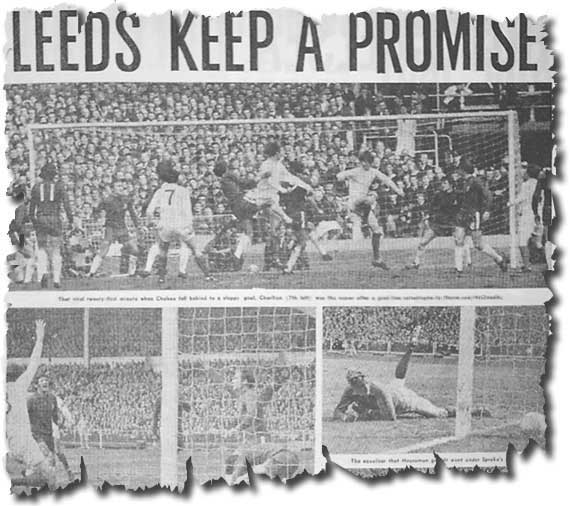 Leeds
United's first two appearances in Wembley Cup finals were among the most
dismal occasions in the illustrious history of the grand old stadium:
in 1965 they played out a dour FA Cup match against
Liverpool, going down 2-1 after extra-time; three years later they
snatched an early goal against Arsenal in the League
Cup and then established a vice-like grip on the trophy via a grim
battle of attrition.
Leeds
United's first two appearances in Wembley Cup finals were among the most
dismal occasions in the illustrious history of the grand old stadium:
in 1965 they played out a dour FA Cup match against
Liverpool, going down 2-1 after extra-time; three years later they
snatched an early goal against Arsenal in the League
Cup and then established a vice-like grip on the trophy via a grim
battle of attrition.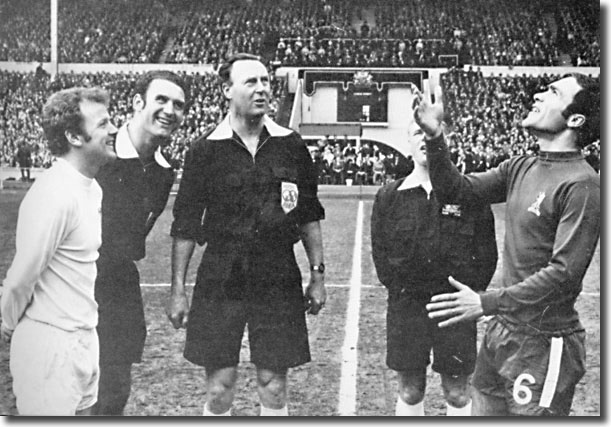 akin to a ploughed field.
akin to a ploughed field.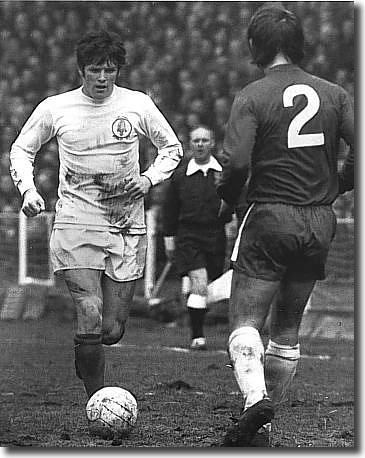 from awkward angles, bounced and
bobbed about, as you tried to ply passes with precision.'
from awkward angles, bounced and
bobbed about, as you tried to ply passes with precision.'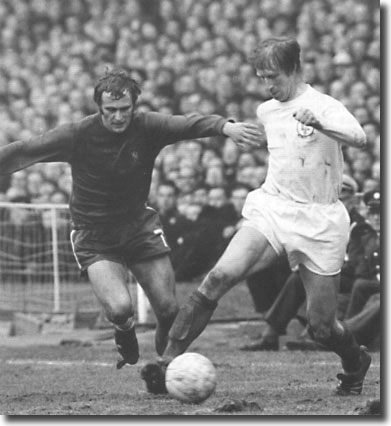 would serve Leeds well, spreading
anxiety throughout the Chelsea rearguard.
would serve Leeds well, spreading
anxiety throughout the Chelsea rearguard.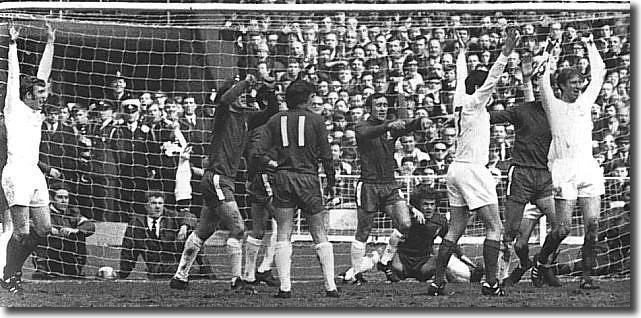 had to go diving full length
to head behind with his nose six inches off the turf. He was under
severe pressure from Baldwin and did superbly to get to the ball.
had to go diving full length
to head behind with his nose six inches off the turf. He was under
severe pressure from Baldwin and did superbly to get to the ball.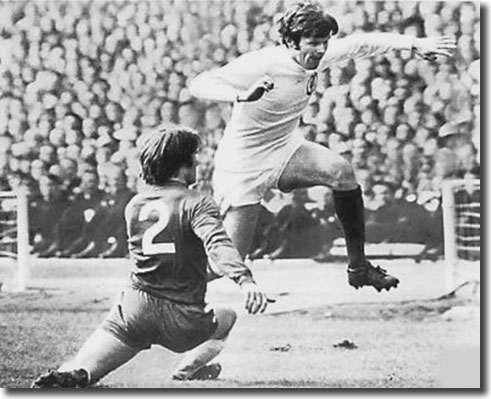 corner dropped perfectly toward the six-yard box.
Bonetti came out for it but misjudged the flight and both Clarke and Charlton
got up in front of him. The centre-half rose
highest of all and nodded the ball goalwards. His header dropped gently
and both Harris and McCreadie were on hand to clear. Harris looked to
be best placed and was swinging into his kick when he checked, thinking
McCreadie had matters in hand. The ball kept low as it bounced and McCreadie
swung wildly over the top of it as it skidded on weakly and dribbled just
over the line. Harris and Osgood both appealed for a foul on Bonetti,
who stood hands on hips in disappointment.
corner dropped perfectly toward the six-yard box.
Bonetti came out for it but misjudged the flight and both Clarke and Charlton
got up in front of him. The centre-half rose
highest of all and nodded the ball goalwards. His header dropped gently
and both Harris and McCreadie were on hand to clear. Harris looked to
be best placed and was swinging into his kick when he checked, thinking
McCreadie had matters in hand. The ball kept low as it bounced and McCreadie
swung wildly over the top of it as it skidded on weakly and dribbled just
over the line. Harris and Osgood both appealed for a foul on Bonetti,
who stood hands on hips in disappointment.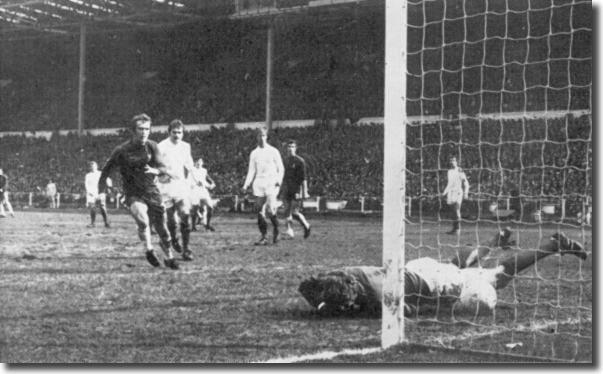 As United men came out to challenge, Cooke
checked back and passed inside to Hollins. The midfielder clipped a ball
forward to the back post about eight yards from Sprake's goal. Hutchinson
rose to nod the ball out to Osgood
who fired in a shot. The ball beat Sprake
and went through Charlton's legs, but the deflection slowed the ball up,
and the centre-half was able to turn and clear with Baldwin challenging.
As United men came out to challenge, Cooke
checked back and passed inside to Hollins. The midfielder clipped a ball
forward to the back post about eight yards from Sprake's goal. Hutchinson
rose to nod the ball out to Osgood
who fired in a shot. The ball beat Sprake
and went through Charlton's legs, but the deflection slowed the ball up,
and the centre-half was able to turn and clear with Baldwin challenging. saved it.'
saved it.'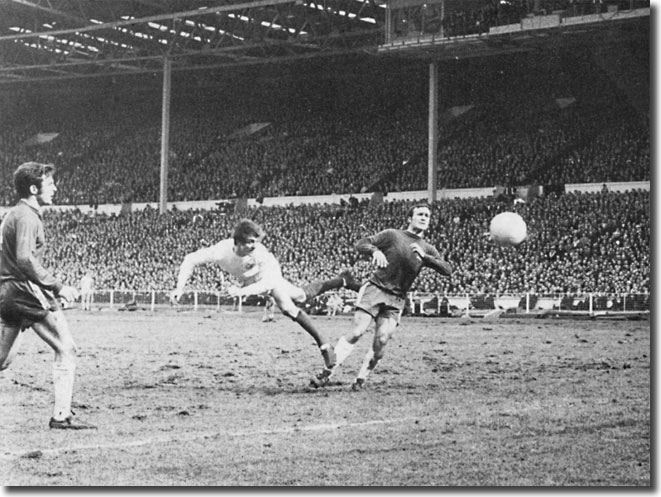 area past the challenges of Bremner and
Cooper to find Hutchinson again. The striker bulldozed his way into a
shot but Sprake blocked it, not once but twice. Osgood struck the loose
ball goalwards only for Hunter to clear from underneath the bar. The ball
reached the six-yard line where Gray trapped it, moved it wide and carried
calmly away before being brought down by Hutchinson
on the edge of the area.
area past the challenges of Bremner and
Cooper to find Hutchinson again. The striker bulldozed his way into a
shot but Sprake blocked it, not once but twice. Osgood struck the loose
ball goalwards only for Hunter to clear from underneath the bar. The ball
reached the six-yard line where Gray trapped it, moved it wide and carried
calmly away before being brought down by Hutchinson
on the edge of the area.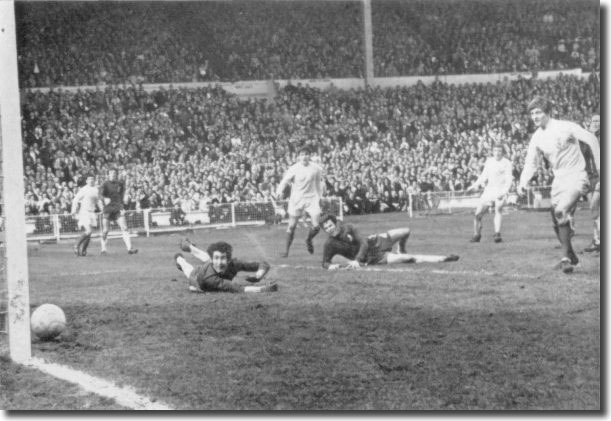 Bremner. The Scot looked up to see what
was on and waited, edging his way forward. Giles had continued his run
to the byline and finally Bremner chipped an inch perfect ball inside
the full-back to the Irishman. His cross fell invitingly for Clarke to
twist like a snake into a diving header before Harris could react. It
was a wonderful effort, beating Bonetti all ends up, but struck the foot
of the post and ran out to the right. Lorimer and a defender both missed
the ball but Jones was in the right spot to fire it left-footed back across
the keeper and into the net off the back post.
Bremner. The Scot looked up to see what
was on and waited, edging his way forward. Giles had continued his run
to the byline and finally Bremner chipped an inch perfect ball inside
the full-back to the Irishman. His cross fell invitingly for Clarke to
twist like a snake into a diving header before Harris could react. It
was a wonderful effort, beating Bonetti all ends up, but struck the foot
of the post and ran out to the right. Lorimer and a defender both missed
the ball but Jones was in the right spot to fire it left-footed back across
the keeper and into the net off the back post.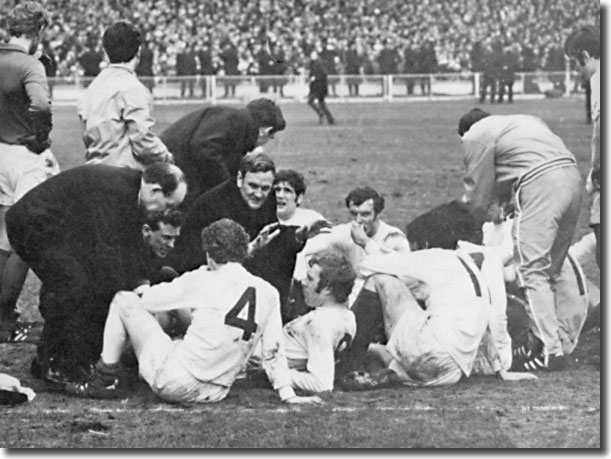 kick the ball into the stands, but didn't connect properly and
it went straight to Hollins, of all people! So Chelsea were able to get
the ball into our penalty area before we had a chance to reassemble.'
kick the ball into the stands, but didn't connect properly and
it went straight to Hollins, of all people! So Chelsea were able to get
the ball into our penalty area before we had a chance to reassemble.'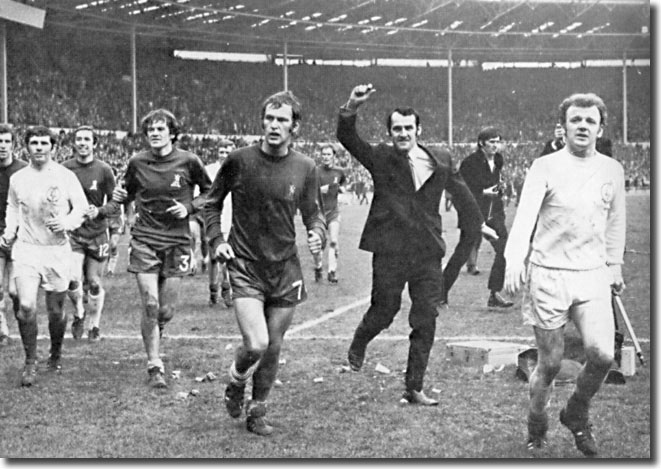 first period, Gray laid on a chance for Giles, but
the Irishman's volley was scrambled off the line by Webb. In the
closing seconds Sprake pulled off an amazing reflex save from
a shot by Houseman which was on its way in. But that was it.
first period, Gray laid on a chance for Giles, but
the Irishman's volley was scrambled off the line by Webb. In the
closing seconds Sprake pulled off an amazing reflex save from
a shot by Houseman which was on its way in. But that was it.